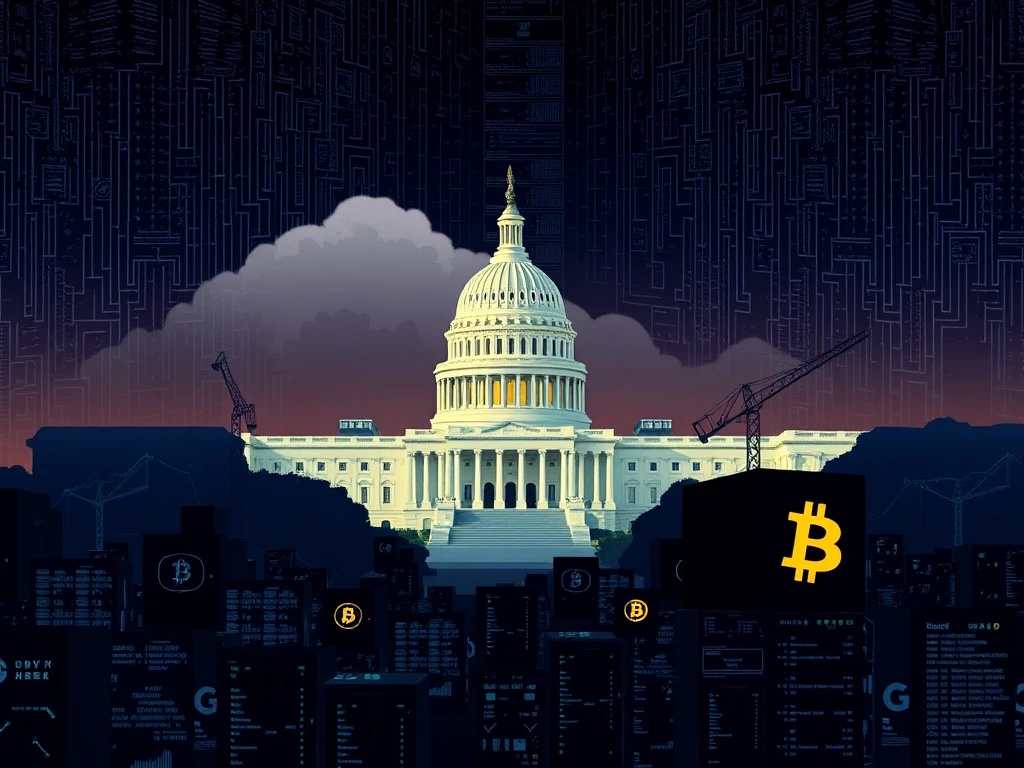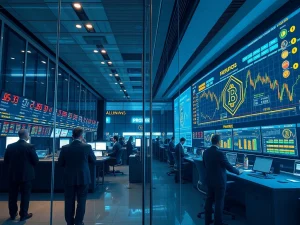Urgent Warning: US Senate Bill Threatens Crypto and AI Data Centers with Hefty Emissions Fees

A potentially disruptive legislative move is brewing in the United States Senate, casting a shadow over the burgeoning cryptocurrency and Artificial Intelligence (AI) sectors. A newly proposed US Senate bill is threatening to impose significant fees on data centers that power blockchain networks and AI models, should they fail to meet stringent federal emissions targets. This development arrives at a critical juncture, particularly as Bitcoin miners are increasingly venturing into the realm of AI to diversify their operations. Will this bill stifle innovation, or is it a necessary step towards environmental responsibility?
Decoding the US Senate Bill: Emissions Fees for Crypto and AI Data Centers
Spearheaded by Senate Democrats Sheldon Whitehouse and John Fetterman, the draft legislation, aptly named the ‘Clean Cloud Act,’ aims to tackle the escalating environmental footprint of energy-intensive industries. According to a Bloomberg report released on April 11th, the bill seeks to mitigate the environmental consequences of surging energy demand and shield households from potentially inflated energy costs.
Here’s a breakdown of the key components of this impactful US Senate bill:
- Emissions Performance Standard: The Environmental Protection Agency (EPA) would be mandated to establish an emissions performance standard specifically for data centers and crypto data centers exceeding 100 KW of installed IT power.
- Regional Grid Focus: The emissions standard will be tailored to regional grid emissions intensities, ensuring a geographically relevant approach to environmental regulation.
- Ambitious Reduction Target: A demanding 11% annual reduction target for emissions is proposed, pushing these industries towards rapid decarbonization.
- Escalating Penalties: Non-compliance won’t be taken lightly. Facilities exceeding the set emissions standard will face penalties starting at $20 per ton of CO2e. This penalty isn’t static; it will increase annually, factoring in inflation plus an additional $10, creating a growing financial incentive to reduce emissions.
The rationale behind this legislative push is clear. A blog post on the US Senate Committee on Environment and Public Works website highlights the concern: “Surging power demand from cryptominers and data centers is outpacing the growth of carbon-free electricity.” The post further projects that data centers alone could account for a staggering 12% of total US power demand by 2028. Morgan Stanley research echoes this concern, estimating that the rapid expansion of data centers could generate approximately 2.5 billion metric tons of CO2 emissions globally by the decade’s end.
Bitcoin Miners at the Crossroads: AI Diversification Under Threat?
VanEck’s head of research, Matthew Sigel, interprets this proposed legislation as specifically targeting Bitcoin miners and similar high-energy operations. In an X post on April 11th, Sigel critiques this approach as a “Losing ‘Blame the Server Racks’ Strategy.” He suggests that singling out these industries is misdirected and potentially harmful.
This bill arrives as Bitcoin miners are strategically diversifying into servicing AI models. Companies like Galaxy, CoreScientific, and Terawulf are increasingly leveraging their infrastructure to provide high-performance computing (HPC) power for the rapidly advancing field of AI data centers. This pivot is partly driven by the challenges faced by Bitcoin miners in 2025, including declining cryptocurrency prices and the impact of the Bitcoin halving on their revenue streams.
Coin Metrics notes that miners are “diversifying into AI data center hosting as a way to expand revenue and repurpose existing infrastructure for high-performance computing.” This diversification had begun to stabilize miners’ incomes in the first quarter of 2025, according to Coin Metrics.
However, the proposed emissions fees could disrupt this nascent recovery and diversification strategy. The added financial burden of potential penalties could make AI diversification less attractive, potentially hindering the growth of both the crypto mining and AI sectors.
Clash with Trump’s Pro-Crypto and AI Stance?
The timing of this US Senate bill is particularly noteworthy considering the contrasting policy landscape under former President Donald Trump. Trump, who repealed a 2023 executive order by former President Joe Biden focused on AI safety standards, has openly declared his ambition to make the United States the “world capital” of both AI and cryptocurrency.
Imposing stringent emissions regulations and hefty emissions fees on crypto data centers and AI data centers could be perceived as conflicting with this pro-innovation stance. It may create regulatory hurdles that deter investment and growth in these sectors, potentially undermining the US’s aspiration to lead in AI and crypto technologies.
Potential Implications and Industry Reactions
The proposed ‘Clean Cloud Act’ raises several critical questions and potential implications for the crypto and AI industries:
- Increased Operating Costs: Emissions fees will undoubtedly increase the operating costs for data centers, potentially impacting profitability and investment in infrastructure.
- Shift to Renewable Energy: The bill could incentivize a faster transition to renewable energy sources within the crypto mining and data center industries, driving innovation in sustainable practices.
- Competitive Disadvantage: If enacted, US-based crypto data centers and AI data centers might face a competitive disadvantage compared to those in regions with less stringent environmental regulations.
- Policy Debates: The bill is likely to ignite significant policy debates regarding the balance between environmental protection, economic growth, and technological innovation.
Nicholas Roberts-Huntley, CEO of Concrete & Glow Finance, points to broader economic uncertainties. He suggests that “aggressive tariffs and retaliatory trade policies could create obstacles for node operators, validators, and other core participants in blockchain networks.” He cautions that “in moments of global uncertainty, the infrastructure supporting crypto, not just the assets themselves, can become collateral damage.”
Conclusion: A Pivotal Moment for Crypto and AI
The US Senate bill targeting crypto data centers and AI data centers with emissions fees represents a pivotal moment for these rapidly evolving industries. While the bill aims to address legitimate environmental concerns and promote sustainable practices, it also introduces potential challenges and uncertainties. As Bitcoin miners and AI data centers navigate this evolving regulatory landscape, the industry must proactively engage in constructive dialogue with policymakers to ensure a balanced approach that fosters both innovation and environmental responsibility. The future trajectory of crypto and AI in the US could very well hinge on the fate of this impactful legislation.










